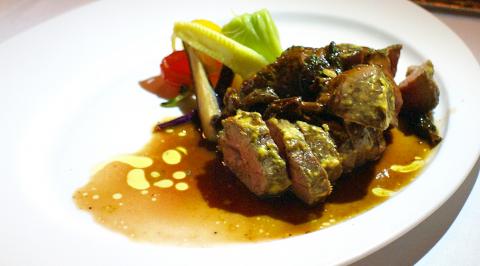Jay Chou’s (周杰倫) restaurant Deja Vu, I thought to myself as I entered it last weekend, will probably follow one of two trajectories, much the same way his career in the entertainment industry has. It will either be a resounding success like the pop music that has made him a household name, or it will be a dud like Pandamen (熊貓人), the television drama he directed that was universally panned by critics and audiences because of its goofy premise and trite plot.
Opened last summer in Huashan 1914 Creative Park (華山1914), Deja Vu at first feels like a finely crafted work of art. With its vaulted arcades supported by stone columns and exposed cement walls adorned with framed paintings of landscapes and portraits of renowned composers, it is immediately appealing. As you move further in, however, it’s Pandamen all the way. The oil paintings are in fact posters and the sumptuous architectural flourishes are offset incongruously by Chou’s gigantic Batmobile, its black surface reflecting the interior’s kaleidoscope of crass disco lighting.
Sure, the Batmobile is sleek and cool and something you’ve probably never seen before, but a car doesn’t belong in the center of a dining room. During my visit, several amateur photographers went up to snap the auto (this reviewer included), bumping chairs and setting off flashbulbs in the process.

Photo: Noah Buchan, Taipei Times
Kitschy movie set production values aside, our party of nine was still prepared to give the service and food the benefit of the doubt. And like the design, the service started out well.
When our party ordered the seafood pizza (NT$480), our server, dressed in formal black, suggested another dish because we had already ordered the seafood risotto (NT$680 for two), which contains similar ingredients. For the first 15 minutes, or so, our water glasses remained full. But when asked if the pasta with clams contained white wine, our server said she didn’t know and she didn’t bother to check. After our main courses were served, our water glasses were not filled up. That was disappointing because the dishes were over-seasoned with salt. This was especially true of the potato and sausage pizza (NT$360) and spaghetti with garlic and clams (NT$420). Both were presented beautifully, but the thin-crust pizza was flavorless and soggy. The pasta, cooked to al dente perfection, contained too much garlic, which overpowered the subtler flavor of the clams.
For many of the dishes, we wondered what we were paying for. The portions of the tapas for two (NT$420), with its array of smoked salmon, foie gras, salami, seasoned octopus and pickled artichoke and garlic, were laughably small and it was obvious that much of it had come from a packet.
Whereas the pizza and pasta left us pining for water, the oven-baked lamb with herb and mustard wine sauce (NT$780) barely registered on the taste buds. The meat was baked to a rosy red hue and tastefully arranged on the plate, but the sauce was bland and the vegetable portions a miniscule and overcooked afterthought. The seafood risotto is the only dish I would consider ordering again. With its generous portions of scallops, shrimp, clams and crabmeat cooked in a buttery white wine sauce, it was a unanimous favorite.
Deja Vu seems to be playing off the fame of its owner. Go for the car, but not the food.

The Taipei Times last week reported that the rising share of seniors in the population is reshaping the nation’s housing markets. According to data from the Ministry of the Interior, about 850,000 residences were occupied by elderly people in the first quarter, including 655,000 that housed only one resident. H&B Realty chief researcher Jessica Hsu (徐佳馨), quoted in the article, said that there is rising demand for elderly-friendly housing, including units with elevators, barrier-free layouts and proximity to healthcare services. Hsu and others cited in the article highlighted the changing family residential dynamics, as children no longer live with parents,

It is jarring how differently Taiwan’s politics is portrayed in the international press compared to the local Chinese-language press. Viewed from abroad, Taiwan is seen as a geopolitical hotspot, or “The Most Dangerous Place on Earth,” as the Economist once blazoned across their cover. Meanwhile, tasked with facing down those existential threats, Taiwan’s leaders are dying their hair pink. These include former president Tsai Ing-wen (蔡英文), Vice President Hsiao Bi-khim (蕭美琴) and Kaohsiung Mayor Chen Chi-mai (陳其邁), among others. They are demonstrating what big fans they are of South Korean K-pop sensations Blackpink ahead of their concerts this weekend in Kaohsiung.

Taiwan is one of the world’s greatest per-capita consumers of seafood. Whereas the average human is thought to eat around 20kg of seafood per year, each Taiwanese gets through 27kg to 35kg of ocean delicacies annually, depending on which source you find most credible. Given the ubiquity of dishes like oyster omelet (蚵仔煎) and milkfish soup (虱目魚湯), the higher estimate may well be correct. By global standards, let alone local consumption patterns, I’m not much of a seafood fan. It’s not just a matter of taste, although that’s part of it. What I’ve read about the environmental impact of the

Oct 20 to Oct 26 After a day of fighting, the Japanese Army’s Second Division was resting when a curious delegation of two Scotsmen and 19 Taiwanese approached their camp. It was Oct. 20, 1895, and the troops had reached Taiye Village (太爺庄) in today’s Hunei District (湖內), Kaohsiung, just 10km away from their final target of Tainan. Led by Presbyterian missionaries Thomas Barclay and Duncan Ferguson, the group informed the Japanese that resistance leader Liu Yung-fu (劉永福) had fled to China the previous night, leaving his Black Flag Army fighters behind and the city in chaos. On behalf of the